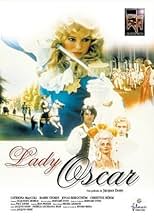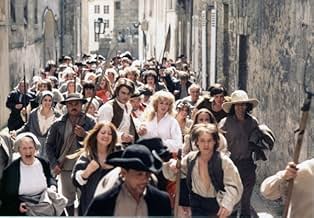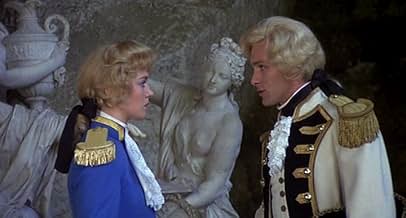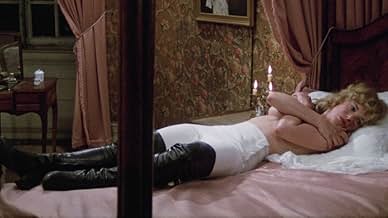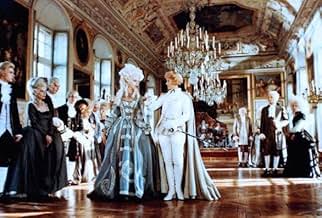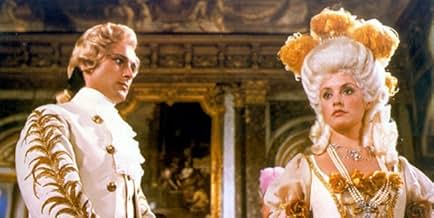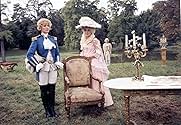अपनी भाषा में प्लॉट जोड़ेंThe story of Lady Oscar, a female military commander who served during the time of the French Revolution.The story of Lady Oscar, a female military commander who served during the time of the French Revolution.The story of Lady Oscar, a female military commander who served during the time of the French Revolution.
फ़ीचर्ड समीक्षाएं
I love the Rose of Versailles (Lady Oscar in West) original comics and was a pleasure to watch this movie. However it's necessary to say it's just for fans. When you previously know the characters and want to get in touch with an alternative point of view, it's OK, but if you take Lady Oscar as a movie about the French Revolution's or a cross dresser heroine, you probably would feel disappointed.
The work was not as good as it would be; some actors and actresses were not well chosen; main events were forgotten; and Oscar's personal drama lost force. But as I said, I liked it a little, because any Lady Oscar's product would attract me.
The work was not as good as it would be; some actors and actresses were not well chosen; main events were forgotten; and Oscar's personal drama lost force. But as I said, I liked it a little, because any Lady Oscar's product would attract me.
Jacques Demy's movie of Lady Oscar frequently moved me. It is not a "swashbuckler" in spirit, it does not glamourise violence; it is not a movie about "girl power". It is a tragedy that raises important questions about freedom and gender. After becoming father to a series of daughters whose mother dies in childbirth, Général de Jarjayes decides that his latest daughter will in fact be a son, Oscar, and brings her up to be an heir and defender of the de Jarjayes name. He is delighted to find her a position as bodyguard to Marie Antoinette. Oscar is unquestioning of the system into which she is inducted, a bubble of privilege, acid wit, and decadence. She is dutiful and she "knows her place". At the same time the young boy and later groom who was her companion when Oscar grew up seems to have much more class consciousness.
What her gender transformation helps to do is to de-romanticise the material, when Oscar accepts a duel, the result, devoid of machismo, comes off as a banal murder, which is precisely what it is. It is difficult to wholeheartedly see Oscar as an éoniste or transgender hero as her identity as Oscar is created for her by her father. Indeed her self-actualisation is intertwined with her accepting a more female identity. On the other hand she does use her identity as Oscar to react against male society, and becomes a role model for some of the Versailles women.
Oscar, despite adopting a male role, is not free. This is potentially quite an important point of the movie, equality and freedom are not the same thing. Her role is to hang around the wilful and indolent Antoinette, and she develops a strong sense that her life has become meaningless. To become a man is not to have meaning, it's an escape from a trap within a trap, the outer trap being the Ancien Régime in the case of this movie. When Oscar attempts to enter a regiment, her male soldiers refuse to obey her, and her superior officer gives her no support whatever. In any case the regiment only exists to suppress the people.
At a very late stage Oscar finds freedom in an act of defiance. You can feel the weight lift off her shoulders as she spends her first day as a truly free adult, despite residing in a prison cell. This feels very contemporary, freedom is something very few of us are born with, it's something we have to seize, it's profoundly personal and cathartic.
Another reviewer on this site refers to Barry Lyndon as inspiration, "Now the magic of that was its carefully spaced vacuums. It had engineered emptiness, something that only a master could do." That is definitely something Lady Oscar is attempting, in my belief it worked better than my fellow reviewer felt.
A note on historical accuracy. Thomas Jefferson described Marie Antoinette as, "...proud, disdainful of restraint, indignant at all obstacles to her will, eager in the pursuit of pleasure, and firm enough to hold to her desires, or perish in their wreck." That is exactly how she is portrayed in Lady Oscar by Christine Böhm. Jefferson also describes the relationship between the King and the Queen thus, "he had a Queen of absolute sway over his weak mind and timid virtue..." Again this seems to have been very well captured in the movie.
Lady Oscar is a politically complex movie which seems often to have been misjudged by relying on a fruitless comparative analysis with the animé and manga sources of the story. Whilst actually quite serious it does however have its gorgeous moments.
What her gender transformation helps to do is to de-romanticise the material, when Oscar accepts a duel, the result, devoid of machismo, comes off as a banal murder, which is precisely what it is. It is difficult to wholeheartedly see Oscar as an éoniste or transgender hero as her identity as Oscar is created for her by her father. Indeed her self-actualisation is intertwined with her accepting a more female identity. On the other hand she does use her identity as Oscar to react against male society, and becomes a role model for some of the Versailles women.
Oscar, despite adopting a male role, is not free. This is potentially quite an important point of the movie, equality and freedom are not the same thing. Her role is to hang around the wilful and indolent Antoinette, and she develops a strong sense that her life has become meaningless. To become a man is not to have meaning, it's an escape from a trap within a trap, the outer trap being the Ancien Régime in the case of this movie. When Oscar attempts to enter a regiment, her male soldiers refuse to obey her, and her superior officer gives her no support whatever. In any case the regiment only exists to suppress the people.
At a very late stage Oscar finds freedom in an act of defiance. You can feel the weight lift off her shoulders as she spends her first day as a truly free adult, despite residing in a prison cell. This feels very contemporary, freedom is something very few of us are born with, it's something we have to seize, it's profoundly personal and cathartic.
Another reviewer on this site refers to Barry Lyndon as inspiration, "Now the magic of that was its carefully spaced vacuums. It had engineered emptiness, something that only a master could do." That is definitely something Lady Oscar is attempting, in my belief it worked better than my fellow reviewer felt.
A note on historical accuracy. Thomas Jefferson described Marie Antoinette as, "...proud, disdainful of restraint, indignant at all obstacles to her will, eager in the pursuit of pleasure, and firm enough to hold to her desires, or perish in their wreck." That is exactly how she is portrayed in Lady Oscar by Christine Böhm. Jefferson also describes the relationship between the King and the Queen thus, "he had a Queen of absolute sway over his weak mind and timid virtue..." Again this seems to have been very well captured in the movie.
Lady Oscar is a politically complex movie which seems often to have been misjudged by relying on a fruitless comparative analysis with the animé and manga sources of the story. Whilst actually quite serious it does however have its gorgeous moments.
The sad truth is that Jaques Demy is a horrible filmmaker. The much celebrated "Umbrella's of Cherbourg" was dreadful. Absolutely dreadful, but pretty in a stagy way. There isn't much you can say when you encounter something pretty but hollow. Of course it happens all the time to me, that I find movies with no soul. like girls trained to be empty.
But there is something notable when something is so very pretty as this is, and so very empty at the same time.
The provenance of this is at least interesting: a Japanese comic book. And if you wish to sit through it, you'll see copious references to "Barry Lyndon," on which this is clearly modeled. Now the magic of that was its carefully spaced vacuums. It had engineered emptiness, something that only a master could do.
This. This is just empty.
Ted's Evaluation -- 1 of 3: You can find something better to do with this part of your life.
But there is something notable when something is so very pretty as this is, and so very empty at the same time.
The provenance of this is at least interesting: a Japanese comic book. And if you wish to sit through it, you'll see copious references to "Barry Lyndon," on which this is clearly modeled. Now the magic of that was its carefully spaced vacuums. It had engineered emptiness, something that only a master could do.
This. This is just empty.
Ted's Evaluation -- 1 of 3: You can find something better to do with this part of your life.
To correct some inaccuracies in the above review, the anime "Rose of Versailles" came before "Lady Oscar," not afterward, and it was not targeted towards children. "Lady Oscar" is primarily based on the manga "Rose of Versailles" by Riyoko Ikeda, although it contains several plot differences from either anime or manga. The so-called "historical clichés" and the feminism the above reviewer cites are part of Ikeda's story and have nothing to do with the director of "Lady Oscar." I found the movie slightly disappointing in its variations from the anime and manga, but overall I liked it. It was nice to see the story of Lady Oscar presented in English, and I enjoyed seeing European actors filling the roles. Oscar's character differs greatly from her personality in the anime, but I found her much more personable in "Lady Oscar." I was disappointed, however, in the portrayal of Marie Antoinette as she was wholly flaky and unlikeable in "Lady Oscar" and lacked all the redeeming qualities she possessed in the anime. Also, the film overlooks the close nature of her relationship with Oscar as portrayed in Ikeda's manga.
This film is an absolute joke. The acting is so horrible that I got up during the film and went to check IMDb to have some entertainment from all of the scathing reviews I was sure I would find... Well, the critics didn't even bother to review it and the only published review was from a person who is probably related to the director or the producer. This film is so bad, I'm sure 40 years from now it will be a cult film simply for its downright awful acting!
क्या आपको पता है
- ट्रिवियाThe major sponsor of the film was the Japanese cosmetics company Shiseido. Catriona MacColl (Oscar) promoted a red lipstick for the spring cosmetic line that year.
- गूफ़In the ballroom scene we see a string quartet and a harpsichordist. However, we hear the soundtrack of a string orchestra.
- कनेक्शनFeatured in L'univers de Jacques Demy (1995)
टॉप पसंद
रेटिंग देने के लिए साइन-इन करें और वैयक्तिकृत सुझावों के लिए वॉचलिस्ट करें
- How long is Lady Oscar?Alexa द्वारा संचालित
विवरण
- चलने की अवधि
- 2 घं 4 मि(124 min)
- ध्वनि मिश्रण
- पक्ष अनुपात
- 2.35 : 1
इस पेज में योगदान दें
किसी बदलाव का सुझाव दें या अनुपलब्ध कॉन्टेंट जोड़ें


